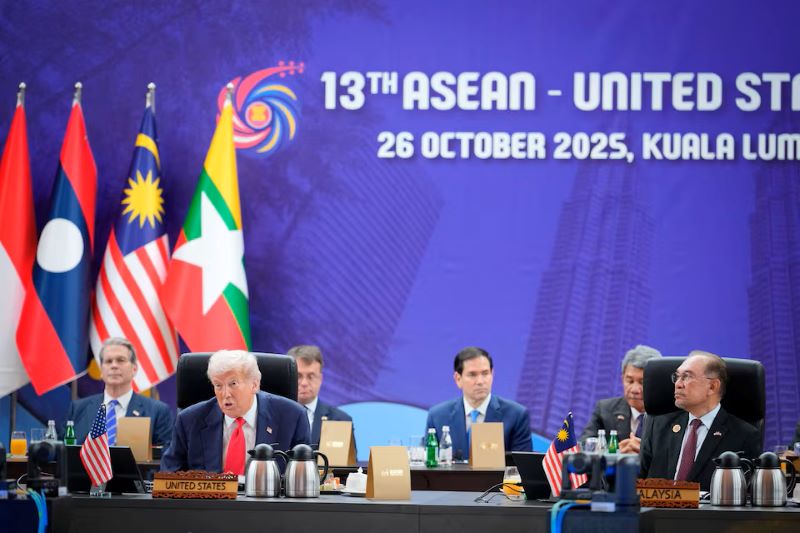U.S.-China Trade Agreement Takes Shape in Kuala Lumpur
The U.S.-China trade agreement gained significant momentum as high-level economic officials from both nations finalized a framework during discussions in Kuala Lumpur on Sunday. The talks, held on the sidelines of the ASEAN Summit, set the stage for an anticipated meeting between U.S. President Donald Trump and Chinese President Xi Jinping later this week. Trump expressed confidence in securing a deal, signaling a potential de-escalation in the ongoing trade tensions between the world’s two largest economies.
U.S. Treasury Secretary Scott Bessent and Trade Representative Jamieson Greer engaged with Chinese Vice Premier He Lifeng and top trade negotiator Li Chenggang in the fifth round of face-to-face negotiations since May. Bessent described the outcome as a “very successful framework” for the leaders’ upcoming discussions, scheduled for Thursday. Speaking on NBC’s Meet the Press, Bessent highlighted that the agreement could prevent China from expanding export controls on rare earth minerals and magnets while avoiding new 100% U.S. tariffs on Chinese goods, as previously threatened by Trump. Key topics included increasing Chinese purchases of U.S. soybeans and agricultural products, achieving more balanced trade, and addressing the U.S. fentanyl crisis, which has driven 20% tariffs on Chinese goods.
Li Chenggang noted that both sides reached a “preliminary consensus” and will now proceed with their respective internal approval processes. He acknowledged the intensity of the negotiations, describing them as “constructive exchanges” aimed at resolving complex issues. The U.S. stance, Li added, has been firm, reflecting the high stakes of the discussions.
Averting a Trade War Escalation
The negotiations aim to prevent a further escalation of the trade war, which has seen both nations impose significant tariffs and export restrictions. Trump’s threat of 100% tariffs on Chinese goods, set to take effect on November 1, was a response to China’s tightened controls on rare earth magnets and minerals. These restrictions have contributed to global supply shortages, raising concerns across industries. Both Washington and Beijing had previously scaled back triple-digit tariffs under a trade truce established in May, which is due to expire on November 10.
During the talks, officials addressed a wide range of issues, including trade expansion, the extension of the truce, U.S. port entrance fees, rare earths, TikTok, and the fentanyl crisis. Li characterized the discussions as “candid,” while Bessent emphasized their depth, calling them “very substantial negotiations.” Bessent also indicated that the trade truce could be extended for a second time, pending Trump’s final decision.
Trump-Xi Summit on the Horizon
President Trump arrived in Malaysia on Sunday for the ASEAN Summit, marking the first leg of a five-day Asia tour that will culminate in a highly anticipated meeting with Xi Jinping in South Korea on October 30. While the White House has confirmed the Trump-Xi talks, Beijing has yet to officially verify the meeting. Trump hinted at additional future engagements, stating, “We’ve agreed to meet. We’re going to meet them later in China, and we’re going to meet in the U.S., in either Washington or at Mar-a-Lago.”
The agenda for the Trump-Xi meeting includes critical issues such as Chinese purchases of U.S. agricultural products, tensions surrounding Taiwan, which Beijing claims as its territory, and the release of jailed Hong Kong media tycoon Jimmy Lai. Lai’s detention, as the founder of the now-closed pro-democracy newspaper Apple Daily, has become a symbol of China’s crackdown on rights in Hong Kong. Trump also plans to seek China’s assistance in U.S. diplomatic efforts with Russia amid the ongoing war in Ukraine.
Navigating a Fragile Truce
The talks come against the backdrop of heightened tensions, as the fragile trade truce, first agreed upon in Geneva in May and extended in August, has struggled to prevent new sanctions and export curbs. China’s tightened restrictions on rare earth exports have prompted the Trump administration to consider blocking software-powered exports to China, including items like laptops and jet engines, according to Reuters. The Kuala Lumpur discussions likely focused on addressing these controls to stabilize global supply chains.
As the November 10 expiration of the trade truce approaches, the outcome of the Trump-Xi meeting will be pivotal in determining whether the U.S. and China can sustain their delicate détente or face renewed economic conflict.














